Network Rail strike: Passengers stay away as nine in 10 trains cancelled
- Published
- comments
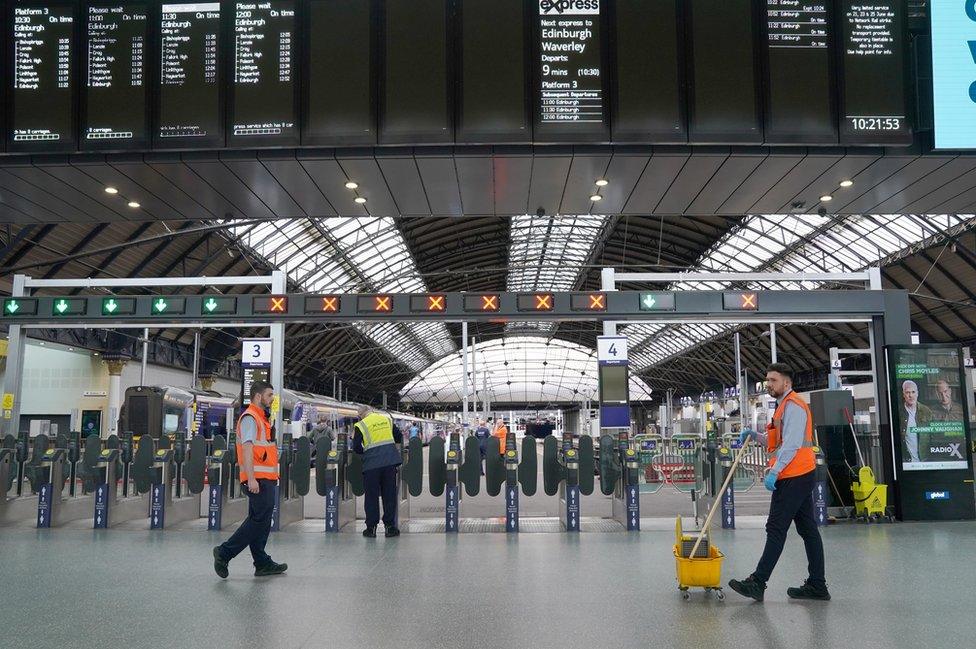
The normally bustling Queen Street station in Glasgow has been quiet all day
Railway stations have been virtually deserted as the first of three 24-hour rail strikes hits services in Scotland.
ScotRail has cancelled 90% of its services while cross-border services were also badly affected.
About 40,000 Network Rail staff are believed to have walked out at midnight on Tuesday in a dispute over pay, working conditions and redundancies.
Last-ditch talks between the RMT union and Network Rail failed on Monday.
It is thought thousands of regular passengers chose to work from home rather than attempt to commute on a vastly-reduced service.
Mick Lynch, the RMT general secretary, blamed the "dead hand" of government for the dispute, saying ministers did not allow employers to negotiate freely.
UK Transport Secretary Grant Shapps said "outdated unions" were "opposing progress".
Scotland's Transport Minister Jenny Gilruth urged the UK government to do more to end the stand-off.
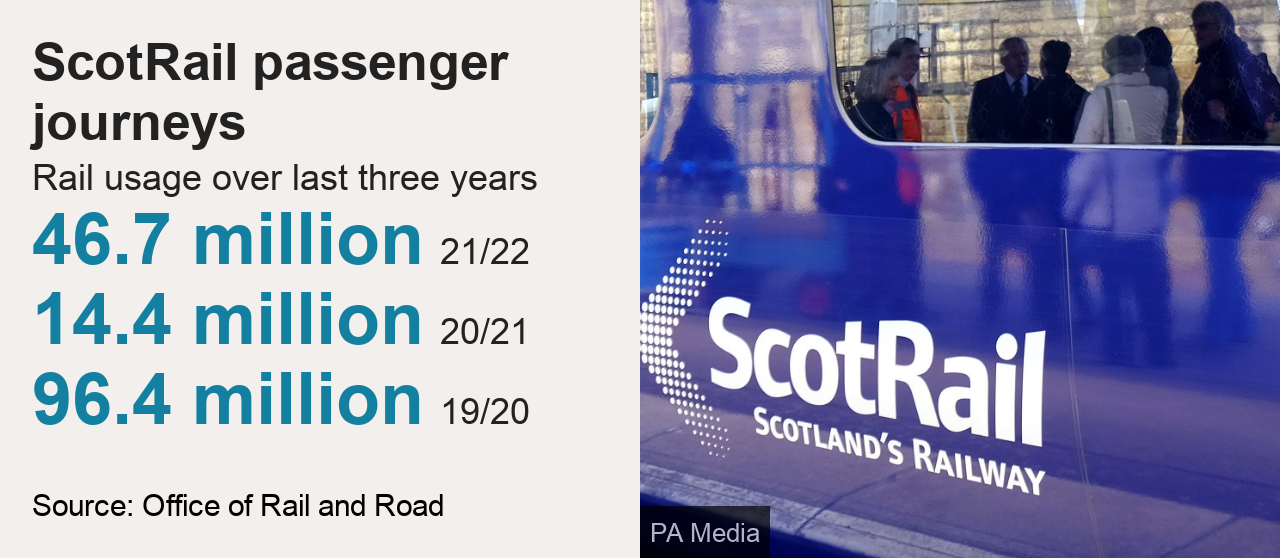
Further strikes are scheduled to take place on Thursday and Saturday but services are likely to be delays and cancellations even on non-strike days.
ScotRail said there would be "significant disruption across the country" on Wednesday, Friday and Sunday caused by the staggered reopening of Network Rail signal boxes.
As the first day of strike action unfolded:
People were advised to plan ahead and only travel by rail if necessary
Businesses said they were already feeling an impact on their takings
The Scottish hospitality sector fears it could lose £50m in a week
First Bus said it would try to run more buses "where possible"
But the operator said it currently has a shortage of about 300 drivers
Businesses in Scotland have been bracing themselves for an impact on their takings as a result of the strike.
Leon Thompson, from UK Hospitality Scotland, predicted the sector was set for "in excess of £50m of losses" this week.
He told BBC Radio's Good Morning Scotland programme: "We're looking at a situation where our fragile businesses are trying to move towards recovery. So it's a very, very difficult week.
"We're talking about businesses which have had two years of restrictions and lockdowns in place, which have severely impacted their ability to trade.
"They are carrying unprecedented levels of debt and they really need to have a good summer. Now this industrial action, which is essentially going to wipe out all business this week, is a real concern."


This is a major strike by any measure. It's the biggest pay dispute on the railways for 30 years. Almost 90% of Scottish services have had to be cancelled. No trains are running outside Scotland's central belt - so there's not a single service for Perth, Dundee, Aberdeen, Inverness, the north or west coast. Only five ScotRail routes see any trains at all, and even these will be limited.
All this underlines the crucial role played by signallers employed by Network Rail, whose strike action has crippled the railways. When they don't work, rail lines grind to a halt.
It means disruption for rail passengers. But a fair number we've spoken to voice sympathy for the signallers' pay demand. The cost of living crisis and soaring inflation affect all but a lucky few. So when rail workers demand a pay rise, that chimes with some passengers - even those whose journeys are disrupted. But if the strike action drags on for weeks or months, will they be quite so understanding?
For now, regular commuters may choose to work from home. That may blunt the impact of this strike. But it worries rail bosses, who desperately want to see passenger numbers return to where they were before the pandemic - from the 70% level we see right now.
ScotRail services are already hit hard by industrial action from train drivers. They are set to vote on a pay deal worth more than 5% in the coming weeks.
Thousands of ScotRail workers are also being offered a similar deal. If these are any sort of benchmark, signallers will hold out for a more generous deal than the 3% they are being offered by Network Rail. If that happens, it could be a long, frustrating year on Scotland's railways.
And much now depends on Network Rail's owner, the UK government, who set the limits for any pay deal.

Richard Muir, deputy chief executive of Glasgow Chamber of Commerce, said a lack of reliable public transport "has a direct affect on our economy and the businesses that rely on it".
One of Scotland's main bus operators, First Bus, said it was prepared for increased demand on strike days but a shortage of 300 drivers meant its ability to provide extra services would be "significantly limited".
Its managing director Duncan Cameron told BBC Scotland that despite still not being back to pre-pandemic levels, bus travel "massively overweighs rail use across the country", carrying passengers on about 74% of public transport journeys.
He said: "It will be difficult for rail users over the coming days with no rail running, but given those margins we believe we can accommodate those who want to move to bus, and where possible we will introduce additional vehicle capacity to do that."
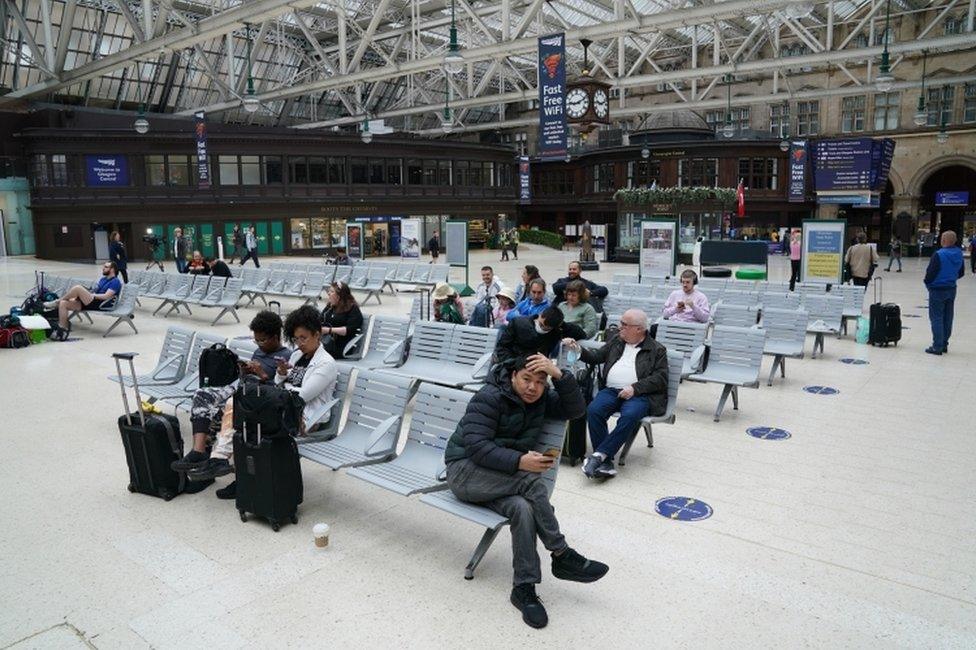
Only a few people were at the usually packed Central Station in Glasgow
National Express said coaches were also in high demand but warned it was not possible for the firm to match the demand of the rail network.
"We do expect and are prepared to be busy but also recommend that customers allow plenty of time when planning their journey," a spokesman said.
This dispute between the RMT union and the companies which run Britain's railway centres on pay, job losses and changes to workers' terms and conditions.
ScotRail staff are not invovled but the train operator, which was nationalised on 1 April, relies on Network Rail workers to operate signal boxes and maintain the track across the UK.
The RMT said Network Rail's plans to cut 2,500 jobs would put safety at risk and has warned that strikes could continue over the next six months.
Network Rail Scotland spokesman Nick King said: "We are still keen to reach a resolution with the union, postpone further strike action if we can, but any deal that is done has to be fair on both our workers and on the taxpayer, who ultimately funds Network Rail's operations."
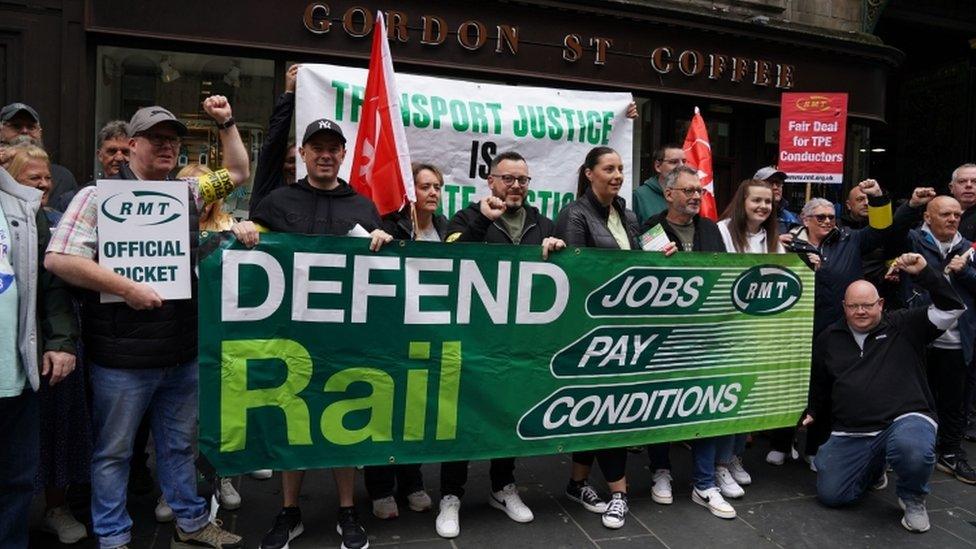
There was a picket line at Glasgow Central Station on Tuesday
On Monday, UK Transport Secretary Grant Shapps told the House of Commons that rail workers were endangering their livelihoods by taking industrial action.
He said the UK government had plans for rail reform and a more "agile, flexible workforce - not one that strikes every time someone suggests a change to the railways".
Jenny Gilruth, Scotland's cabinet secretary for transport, called on Mr Shapps "to seek a resolution to this dispute, as quickly as possible, for the benefit of staff and passengers alike".
Gordon Martin, RMT organiser, told BBC Scotland they had been "forced" to take strike action.
"This is of the UK government's making," he said. "We have been forced into this as a defensive measure. Our members' jobs and livelihoods are at risk here.
"More importantly, the safety of the rail infrastructure is at risk and safety in railway stations and on trains is at risk."
- Published21 June 2022
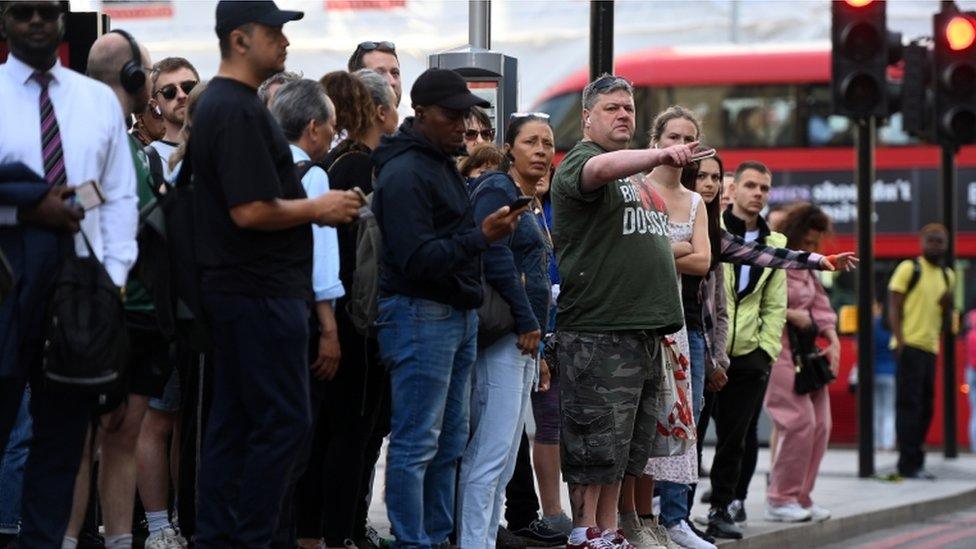
- Published21 June 2022
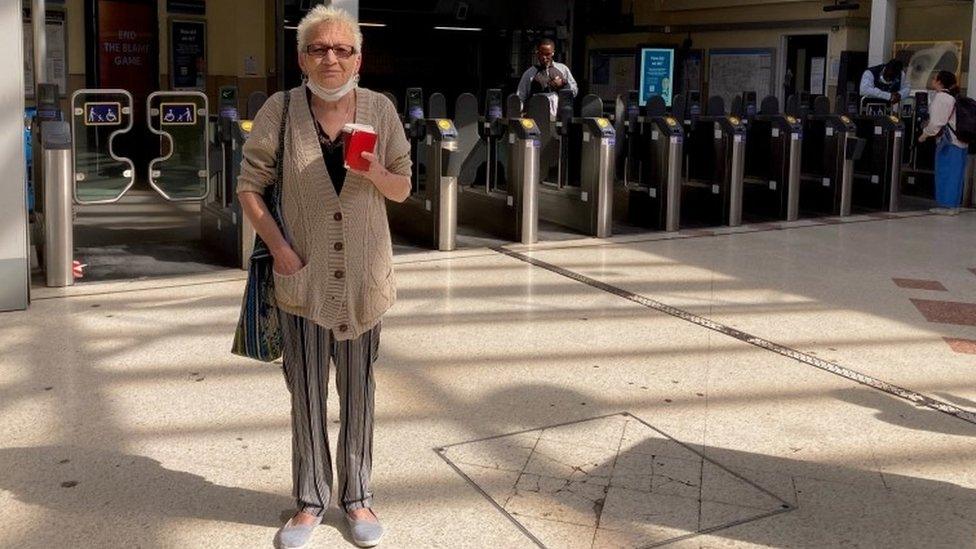
- Published19 August 2022
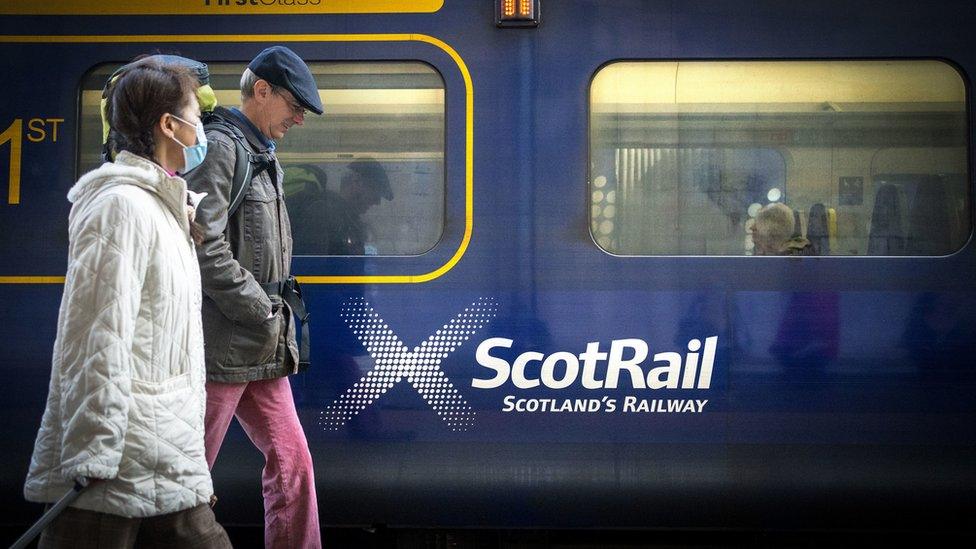
- Published18 June 2022
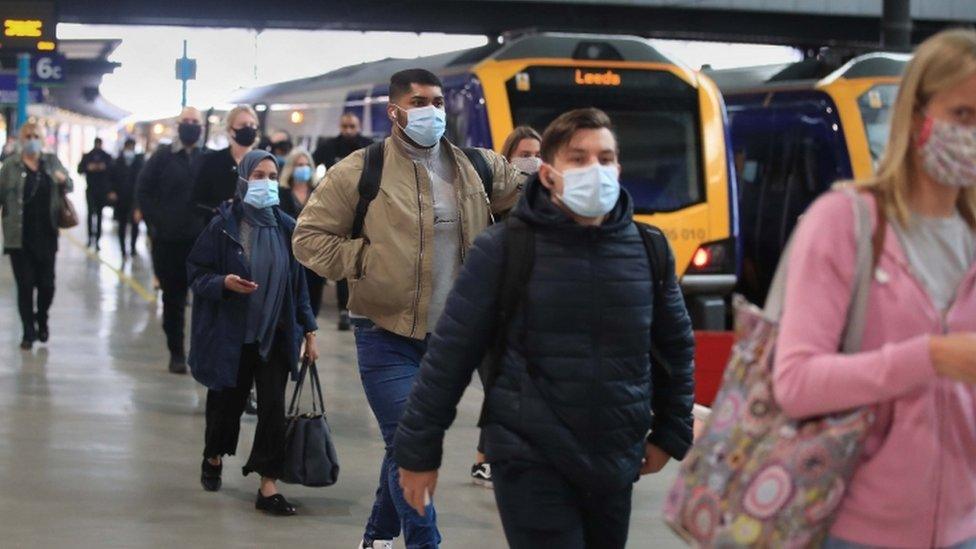
- Published16 June 2022
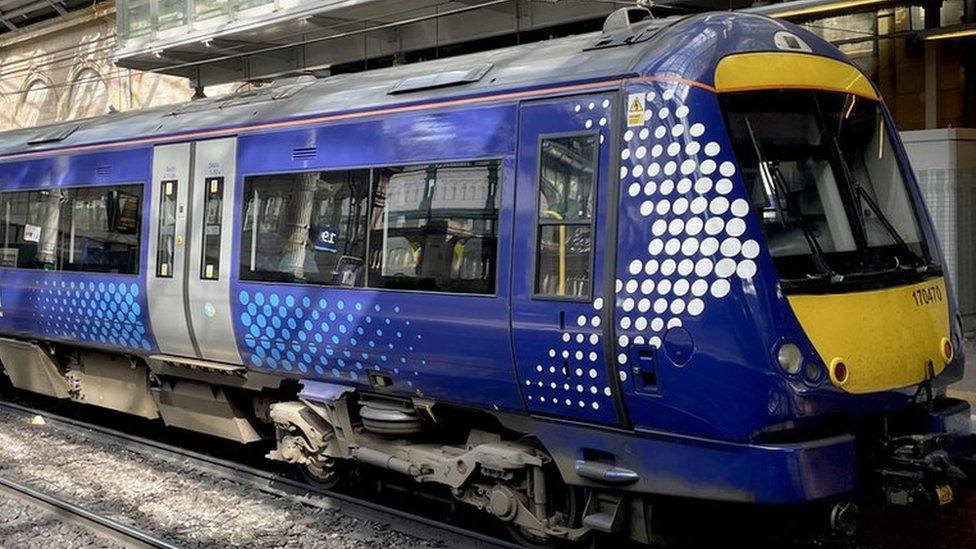
- Published15 June 2022
